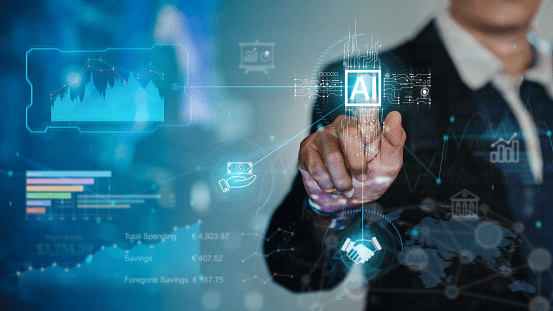Automating work processes these days won’t surprise many people, even in small businesses. Automated cowsheds with car parks already exist, complex production lines work without the participation of people, and the sorting of goods in delivery companies resembles a multi-level maze in which small robot loaders scurry. All of these examples have one common denominator: replacing people with automation.
In search of benefits, humanity has taken a step further. The development of artificial intelligence today allows programs to do the work where you need to think, analyze, and invent. Neural network-based programs analyze market trends. Robots write news for the media. Chatbots interview job candidates and offer goods better than the best sellers.

Is it now possible to fully automate small businesses with the help of smart programs and eliminate analysts, strategists, and creative employees from the company’s staff? And most importantly–is it necessary? Let’s look at some interesting cases in the finance sphere.
Illustrative Examples
To understand why the usage of AI for finance is becoming a global trend in the digitalization of the financial sphere, it’s enough to consider several typical cases of AI usage in fintech. When you use AI to score customers, you can cut the time it takes to approve an application from days to minutes. The price of scoring decreases, and its quality improves, affecting the delay. AI in voice assistants is, first of all, an intelligent call routing system inside call centers. And secondly, it’s communication with the client through a voice assistant inside applications. Today, it can handle up to 80% of calls on its own in intelligent mode and 10% of calls on its own without having to talk to a person. The service time for each customer decreased by 40 seconds on average. If the voice assistant is implemented correctly, customers will wait much less, and when they wait, they are routed to the right employee with the right point request.
Trading
Using computing power to trade stocks is not a new idea. Algorithmic trading has been used for over 30 years and occupies a significant market share, moving towards high-frequency trading.
Artificial intelligence helps manage and supplement trading rules and other trading decisions. AI also assists in processing data and creating new algorithms that correspond to patterns not previously empirically found but laid down in the form of hidden, hard-to-distinguish structures. In this regard, hedge fund managers and traders cannot compete with artificial intelligence, which is capable of processing extremely large arrays of time series data and improving forecasts based on previous successes and mistakes. Research has shown that hedge funds using AI show significantly better results than those in which key decisions are based on people’s experience.
Investing
Investment companies have applied trading schemes for years based on sentiments and opinions obtained from social networks and other public information sources. In the B2C management arena, robot assistants complement portfolio management and rebalance decisions made by people by analyzing the portfolio itself, its risk tolerance, and previous investment decisions.

Lending
Machine learning is changing the game’s rules in the field of lending, increasing the quality of credit scoring and giving a more precise assessment of the risk of lending. Thus, there are cases of applying for advances in AI derived from genomics and particle physics, which give lenders nonlinear dynamic models of credit risk that are radically superior to traditional approaches. Such algorithms can be successfully applied to the short credit histories of young people and self-employed professionals. For example, to create a credit risk model. It sounds discouraging, but AI allows you to generate ideas to cover outstanding debts.
Provision of Banking Services
Chatbots help banks serve customers more efficiently, even if they cannot support their financial affairs independently. Thanks to natural language processing algorithms, bots can listen to calls involving bank representatives, quickly prompt accurate answers, and offer best practices to improve sales efficiency. Neural networks help agents respond to common service requests by sorting and labeling metadata, generating possible respondent responses, and indicating the probability of each of them. With this approach, it is much easier to organize personalized customer support and reduce the time and costs of working with each client.
Fraud Detection
Anti-fraud is also among the striking examples demonstrating the advantages of using AI in fintech. And the use of AI to detect atypical activities makes it possible to annually stop about 7 billion fraud attempts in the U.S. Recent research has shown that false positives related to legitimate transactions mistakenly rejected due to suspicion of fraud lead to annual losses in retail trade of $118 billion. Not to mention the lost customers who refuse the issuer’s services due to such errors.
ML algorithms analyze various input data to identify fraudulent transactions, minimizing the number of false positives, thereby saving money for both banks and customers.
Personality Recognition
Recent advances in deep learning have increased image recognition accuracy to levels beyond human capabilities. For example, automatic authentication of identity documents or connection to various publicly available databases would enable employers to quickly verify identity and personal data, including driver’s licenses and criminal records.
Conclusion
Artificial intelligence has unlimited possibilities of application in all business fields, in particular in the area of financial services, which will definitely transform the industry in the coming years. For proper work with algorithms and finance, using AI in the financial services environment is becoming increasingly important. Using automatic assistants in trading on the stock exchange reduces the possibility of taking advantage of market inefficiencies. It is no longer people, but statistical models that compete with each other. What is more, using AI definitely simplifies and automates all processes.






